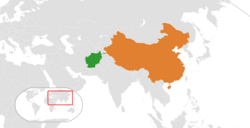Afghanistan–People's Republic of China relations
 |
|
|
Afghanistan |
China |
|---|---|
Afghanistan – People's Republic of China relations were mostly warm and friendly during most of the 20th Century but after the Soviet invasion of Afghanistan in 1979, relations severely deteriorated. In the 21st century relations have improved significantly.
Throughout history, the relations between Afghanistan and China mostly involved trade of fruit and tea via caravans through Xinjiang and the Wakhan Corridor on the border between the two countries.
Buddhist monks from the area of what is now Afghanistan were involved in the Silk Road transmission of Buddhism to Han dynasty China. The Han dynasty's Protectorate of the Western Regions bordered the Kushan Empire.
During the Tang dynasty parts of Afghanistan were under the control of China's Protectorate General to Pacify the West. In 659, Soghd and Ferghana, along with cities like Tashkent, Samarkand, Balkh, Herat, and Kabul, became part of the protectorate under Emperor Gaozong. Afghanistan's Herat and Uzbekistan's Bukhara and Samarkand became part of the Tang protectorate. The defeat of the Western Turks and the defeat of the Sassanids by the Arabs had facilitated the Chinese expansion under Emperor Gaozong into Herat, northeastern Iran and Afghanistan (Tukharistan), Bukhara, Samarkand, Tashkent, and Soghdiana, which previously belonged to the western Turks.
Faxian traveled in Afghanistan.
Chinese Muslims fought against Japan in World War II. In order to gain backing for China in Muslim countries, Egypt, Syria, and Turkey was visited by Hui Muslim 馬賦良 Ma Fuliang and Uyghur Muslim Isa Yusuf Alptekin in 1939. The Hindu leaders Tagore and Gandhi and Muslim Jinnah both discussed the war with the Chinese Muslim delegation under Ma Fuliang while in Turkey İsmet İnönü met with the Chinese Muslim delegation. Newspapers in China reported the visit. Ma Fuliang and Isa were working for Zhu Jiahua.
...
Wikipedia
